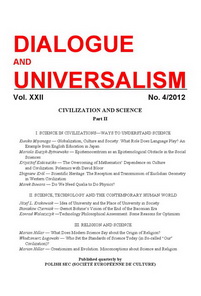Following the well known inverted spectrum argument by John Locke we examine
Following the well known inverted spectrum argument by John Locke we examine
Author(s): Konrad WaloszczykSubject(s): Philosophy
Published by: Instytut Filozofii i Socjologii Polskiej Akademii Nauk
Keywords: technology; moral progress; evolution; global brain; complexity— consciousness law.
Summary/Abstract: The author presents a schematic outline of two approaches in contemporary philosophy of technology, the first of which is rather pessimistic, with technological progress seen as a rising force which subjugates humans and, to use Martin Heidegger’s words, “hampers, oppresses and drags them along in its tracks.” Also underscored is the failing relation between scientific and technological progress and moral development. The second approach, presented in reference to the thoughts of Pierre Teilhard de Chardin, interprets scientific and technological progress as the creation of tools enabling the unity of mankind and further evolution. The author supports Teilhard’s view, which he sees as a better motivation to build a better world.
Journal: Dialogue and Universalism
- Issue Year: 2012
- Issue No: 4
- Page Range: 103-109
- Page Count: 7
- Language: English
- Content File-PDF

